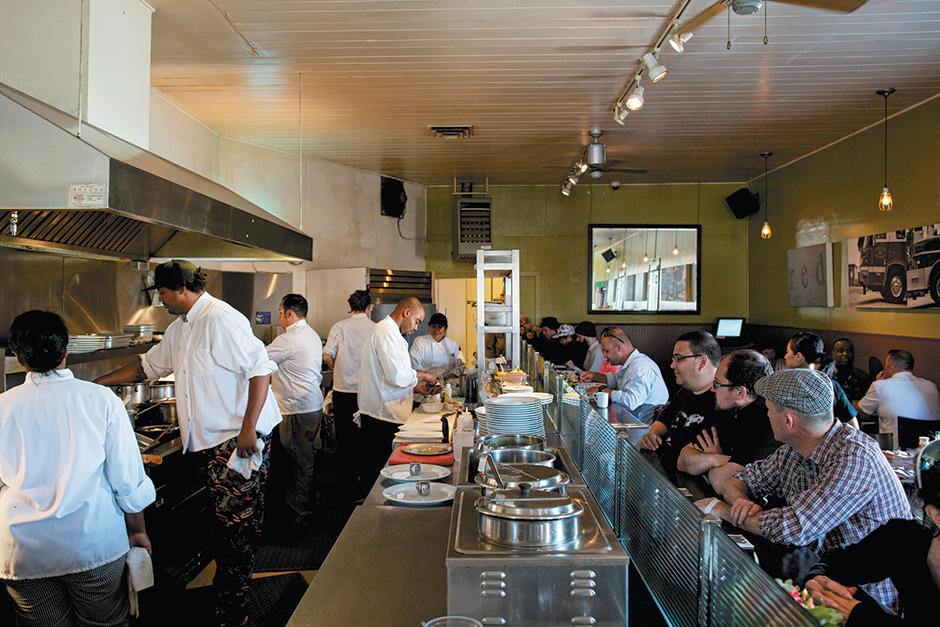Oakland—like a swinging party, like an emergency—is happening.
Oakland is always happening. From the moment of its founding, in the 1850s, by a nefarious confederation of squatters, opportunists, filibusterers, graft artists, boosters, visionary thieves, and confidence men, Bump City has been happening. And yet, in all that time, Oakland has never quite happened. Or rather, Oakland never has happened. Oakland has never had its day. It has never gone soft, grown fat, rested on its laurels.* It has never entirely gotten its act together, remembered to set its alarm clock, made it through to payday, waited for its cake to cool completely. There is a there there (Oakland coolly says “Bite me” to Gertrude Stein); but Oakland’s not there yet.
Getting there, though. Oakland is—always, forever—getting there.
Oakland is like America in that way. Oakland is like America in a lot of ways—violent and peace-loving, burdened by a calamitous racial history, factious and muddled, friendly and casual, rich in local genius and in natural beauty, poorly governed, sweet-natured, cold-eyed, out to lunch, out for blood, out for a good time. And, above all, promising. Every day, Oakland makes and breaks the American promise, a promise so central to the idea of America that we carry it around everywhere we go, in our wallets, jingling in our pockets. I mean, of course, E pluribus unum: out of all the scattered sparks, one shining light. It’s a utopian promise, and like all utopian promises, liable to breakage. But even if that promise can never truly be redeemed, it can be—it must be—endlessly renewed. And it’s the work that we put in, day after day, toward renewing the promise, not the promise’s fulfillment, that really matters.
Tanya Holland knows that. Every day, starting at 5:30 AM, she renews Oakland’s promise at Brown Sugar Kitchen, a little hip-pocket utopia on a triangular lot between an auto-salvage yard and the free-range graffiti farms of the city’s wild west end. Of all the many good restaurants, greasy-spoon to top-drawer, that make up a substantial share of the cultural wealth of Oakland, Tanya’s Brown Sugar Kitchen most clearly, most faithfully, and most thrillingly embodies, one plate of chicken and waffles at a time, the ongoing, ever-renewed promise of the city she has come to love and, in a very real sense, to represent.
Drop by Brown Sugar Kitchen for breakfast or lunch, take a seat at one of the tables or at the long counter of its brightly painted, post-industrial-Creole-lunchroom-style interior, and you will find people of all ages and stations, professing various brands of faith or doubt, tracing their ancestries to Africa and Europe, Asia and South America, to the Cherokee, Shawnee, or Creek. You might very well find all those inheritances gathered around a single table, perhaps even in the genetic code of a single member of the waitstaff. Diversity in the kitchen and dining room is hardly unusual in an Oakland restaurant, of course—that’s one of the things to love about Oakland. And even in a city segregated far more determinedly than Oakland, such as Memphis or Houston, I’ve noticed that a popular soul-food restaurant will often feature the most integrated tables in town—that’s one of the things to love about soul food. Beans, rice, and collards are a powerful force for transformation.
But the crowd is different at Brown Sugar Kitchen, starting with the proprietors themselves (Tanya’s black; her husband and the house DJ, Phil Surkis, is a Jew from Hartford). More jumbled, the lines of race and class drawn more faintly than in Oakland’s other restaurants, soul-food or otherwise. A more purposive clientele, I want to say, self-jumbled, everybody showing up with his or her own eraser to rub away at those lines a little more. One of the most beautiful things about human beings, in the midst of so much that is ugly, is the desire that takes hold of us, if only we can manage to leave our homes, our villages, and our little worlds behind, for the companionship of people from Elsewhere.
Make no mistake; people come to Brown Sugar Kitchen for the food. I believe that I could be hauled back from the gates of the Underworld by the prospect of a bowl of Tanya’s shrimp and grits. But it was Oakland and not some other town, remember, that cradled the visions of the most high prophet Sly Stone, and to a greater extent than I’ve found in other American cities, the Everyday People of Oakland are hip to the possibility that the point of the journey is neither the destination nor the journey itself but rather the coming to a crossroads, to a watering hole, to what Archy Stallings, the local real estate agent who is one of the main characters in my novel Telegraph Avenue, likes to call a caravansary. The point of the journey, to the everyday wanderer, is the feeling that comes with crossing the threshold of one of those magical places along the way, built on the borderline between here and there, where the stories and the homelands and the crooked routes of history come together in a slice of sweet potato pie.
Advertisement
Maybe the word I’m looking for to describe the spirit that imbues the patrons and the principals of Brown Sugar Kitchen is something more like “mindfulness.” (An East Bay word if there ever was one.) As lovers of Oakland, Tanya and Phil are mindful that the neighborhood where they chose to build their caravansary is the broken heart of the city, the place where all those industrious scoundrels who afterward lent their names to streets and civic buildings first conspired to defraud, disencumber, and relieve the Peralta family of a vast tract of land, encompassing present-day Oakland, that had been a grant of the Spanish crown in the early 1820s. All the paths of ancestry and migration taken by Oakland’s founding peoples—Indian, Spanish, Mexican, Anglo-, Asian-, and African-American—are densely knotted, in West Oakland, with its physical routes and roadways, its boulevards and streets.
West Oakland is the great crossroads of the city’s history, the stage and the scene of its starkest crimes and dramas, its most tragic comedies, from the founding land grab to the glory of the Pullman strikes, from the apocalyptic destruction rained down by federal urban policy in the Sixties to the collapse of the Great Beast of urban renewal, the Cypress Freeway, during the Loma Prieta earthquake of 1989. The Black Panthers, the Oakland Oaks, shipbuilders and railway workers, immigrant Jews and Portuguese, Okies and followers of the Great Migration, all came and went along Market and Cypress and West Street, as neighborhoods rose and fell, and Huey P. Newton got murdered, and the industrial demands of two world wars brought a measure of security and comfort, often for the first time, to people whose status had been marginal and precarious. Tanya and Phil were mindful, in choosing the site for their caravansary, that there could be no better place than along the Mandela Parkway, the enchanted road that grew up, gracious and wide and landscaped with greenery, in the gap that had once been the dark underbelly of the Cypress Freeway.
Tanya showed the same mindfulness in conceiving her Kitchen, in formulating her recipes, in committing herself to the cooking of soul food. This was, by her own admission, an unexpected choice. Though her ancestral and culinary roots go back to rural Louisiana and Virginia, Tanya had come west with plans to open a place that would showcase her training at the La Varenne school in Burgundy; but then she dialed in to the local vibe, to the Sly Stone vision, that Oakland state of mind. And one day she found herself standing on the 2500 block of the Mandela Parkway, feeling those paths of ancestry, those trails and roads and streets and railheads all coming together in the great soul terminus of West Oakland, and determined to set up shop there, along the banks of the Mandela, and lay down her own artful and inspired version of the Oakland promise in the form of po’ boys, roux, and waffles.
Consciously or intuitively—mindfully—Tanya made this culinary choice, I believe, because the cuisine we know as soul food—so styled sometime in the 1950s, around the time rhythm and blues was becoming soul music—comes closer than any other product of American art and ingenuity to redeeming the promise of E pluribus unum. Peanuts, rice, okra, and yams from Africa; Central American beans and cassava; European pork, cabbage, molasses, and turnips; Indian corn and hominy, berries and greens: soul food is the caravansary along the road from the African past to the American present, from freedom to slavery to freedom again. Soul food is the little joint at the broken heart of America where all the kitchen inheritances ingather, and get tangled like travelers’ yarns, like the paths of exile and homecoming, like strands of DNA. From the day she opened her little utopia on the Mandela Parkway, Tanya has been making and keeping and redeeming her promise: Come on in, all of you everyday wanderers, and take a seat, and I will feed your soul. Oh—and come hungry.
-
*
Oakland is believed to have been obliged, somewhere along the line, to pawn its laurels, or perhaps to have sold them on Craigslist. To be honest, no one is entirely sure what happened to the laurels. (This essay appears in different form in Tanya Holland, Brown Sugar Kitchen: New-Style, Down-Home Recipes from Sweet West Oakland, published by Chronicle in September.) ↩




